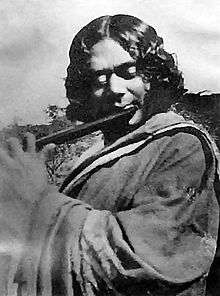Pralayollas
Pralayollas (Bengali: প্রলয়োল্লাস, The Ecstasy of Destruction or Destructive Euphoria), also known after its first line as Tora sab jayadbhani kar is a popular revolutionary Bengali song set to Dadra Tala, whose lyrics and tune were written by national poet Kazi Nazrul Islam in 1921.[1] It was the first revolutionary Bengali poem collected in early 1922 in a volume titled Agnibeena: the first anthology of Nazrul's poems.[2][3][4][5]
| English: The Ecstasy of Destruction | |
|---|---|
| Pralayollas প্রলয়োল্লাস | |
 Kazi Nazrul Islam, composer of the song | |
| Lyrics | Kazi Nazrul Islam, 1921 |
| Music | Kazi Nazrul Islam, 1921 |
Lyrics
তোরা সব জয়ধ্বনী কর!
তোরা সব জয়ধ্বনী কর!
ঐ নতুনের কেতন ওরে কাল- বোশেখীর ঝড়।
তোরা সব জয়ধ্বনী কর!
তোরা সব জয়ধ্বনী কর!
আসছে এবার অনাগত প্রলয়- নেশার নৃত্য পাগল
সিন্ধুপারের সিংহ- দ্বারে ধমক হেনে ভাংল আগল।
মৃত্যু- গহন অন্ধ-কুপে
মহাকালের চন্ড- রূপে-
ধুম-ধুপে
বজ্র-শিখার মশাল জ্বেলে আসছে ভয়ংকর-
ওরে ঐ হাসছে ভয়ংকর।
তোরা সব জয়ধ্বনী কর!
তোরা সব জয়ধ্বনী কর!
দ্বাদশ রবির বহ্নি-জ্বালা ভয়াল তাহার নয়ন- কটায়,
দিগন্তরের কাঁদন লুটায় পিঞ্জল তার ত্রস্ত জটায়।
বিন্দু তাহার নয়ন জলে
সপ্ত মহাসিন্ধু দলে
কপোল-তলে।
বিশ্ব-মায়ের আসন তারি বিপুল বাহুর' পর-
হাঁকে ঐ জয় প্রলয়ংকর!"
তোরা সব জয়ধ্বনী কর!
তোরা সব জয়ধ্বনী কর!
মাভৈঃ, মাভৈঃ! জগৎ জুড়ে প্রলয় এবার ঘনিয়ে আসে।
জরায় মরা মুমুর্ষদের প্রান-লুকানো ঐ বিনাশে।
এবার মহা নিশার শেষে
আসবে উষা অরুণ হেসে
করুণ বেশে।
দিগম্বরের জটায় লুটায় শিশু চাঁদের কর,
আলো তার ভরবে এবার ঘর!
তোরা সব জয়ধ্বনী কর!
তোরা সব জয়ধ্বনী কর!
References
- Huda, Mohammad Nurul (1986). Flaming Flower: Poets' Response to the Emergence of Bangladesh (1st ed.). Dhaka: Bangla Academy. p. 189.
- Langley, Winston E. (2009). "Introduction". Kazi Nazrul Islam The Voice of Poetry and the Struggle for Human Wholeness. Dhaka: Nazrul Institute. p. 12. ISBN 984-555-384-2.
- Culturopedia.com. "Kazi Nazrul Islam". www.culturopedia.com. Archived from the original on 2016-09-04. Retrieved 2017-03-22.
- "Kazi Nazrul Islam: The Rebel Poet | IndiaFacts". IndiaFacts. 2014-08-15. Retrieved 2017-03-22.
- "The rebel poet". The Daily Star. 2010-09-06. Retrieved 2017-03-22.